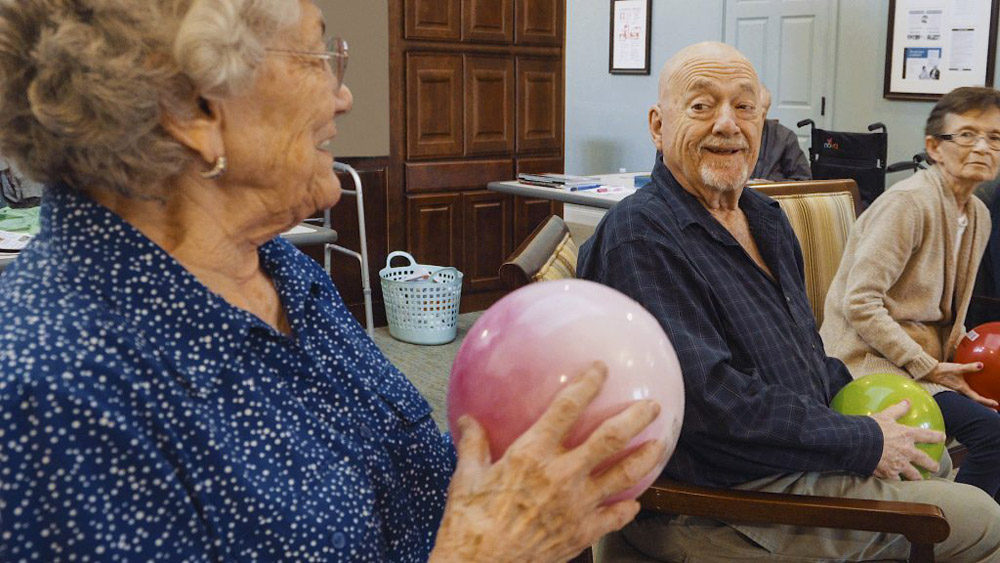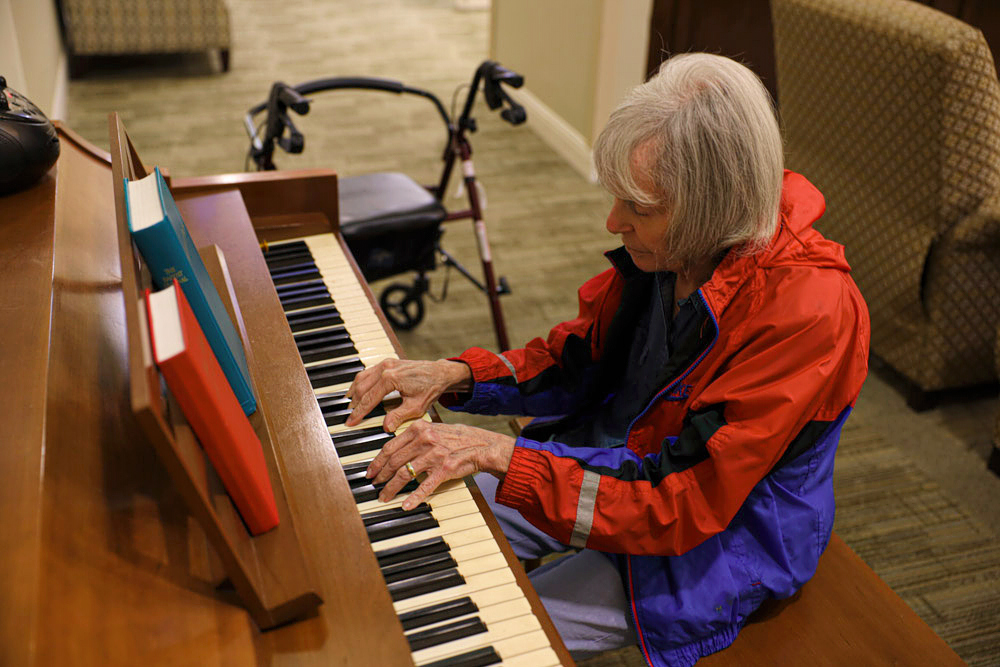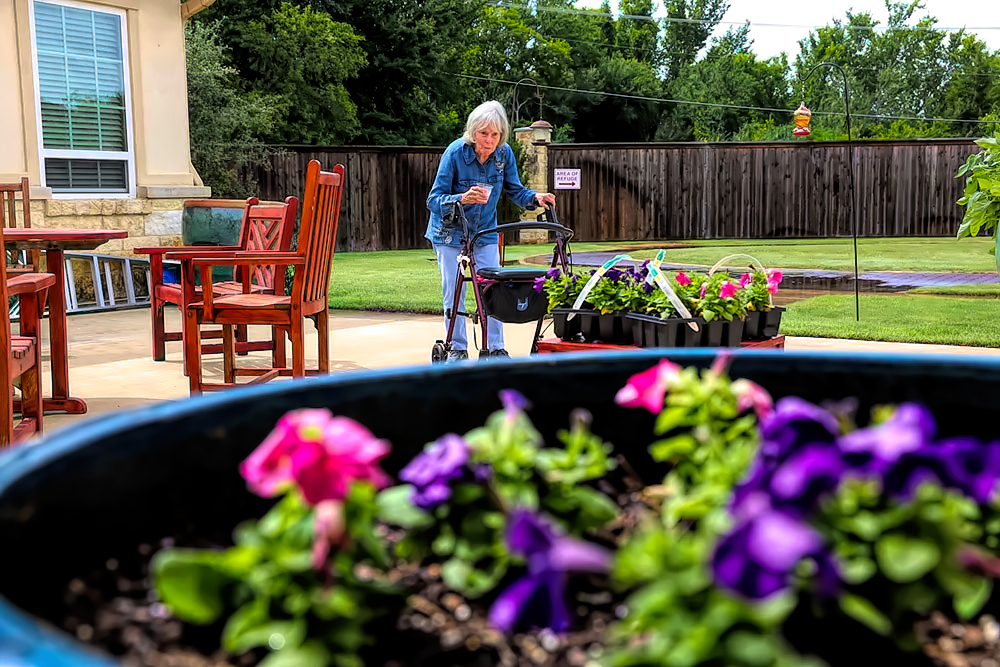Memory Care vs. Nursing Home: Comparing The Differences

Figuring out what type of facility your loved one needs as they age can be a confusing and overwhelming process. However, some older adults don’t have as much need for hands-on care, and an assisted living facility meets their needs.
But many older adults who suffer from Alzheimer’s disease, dementia, or severe health issues will need a higher level of care at either a nursing home or memory care facility.
In this post, we’ll break down the difference between Memory Care vs. Nursing Home and help clarify which one is right for your loved one.
Nursing Home

Staff
Staff at nursing homes are trained in medical care and assisting with activities of daily living (ADLs) such as eating, getting dressed, and using the bathroom.
Nursing homes typically have 50 to 100 residents.
Privacy is limited since many residents need hands-on care.
In addition to daily meals and assistance with ADLs, nursing homes also offer medication management, IV therapy, respiratory therapy, and therapeutic services such as physical therapy, speech therapy, and occupational therapy.
Activities
Nursing homes also offer a range of activities for residents, such as movies, music, and games.
Facilities & Security
They offer 24/7 security of the building to keep residents safe and often have outdoor grounds available to residents who can walk or go outside in a wheelchair.
Estimated Costs
The cost of a nursing home depends on many factors and varies from state to state, but most short-term care at nursing homes can be covered up to 80% by Medicare.
Long-term stays can be covered up to 100% by Medicaid if you qualify financially.
If you’re paying out of pocket, the average cost for a private room in a nursing home facility in the U.S. is about $8,500 per month.
A nursing home is a good option for your loved one if they need rehabilitative care, cannot walk on their own, or need help managing severe health problems.
Suppose your loved one has Alzheimer’s disease, dementia in the mid to late stages, or other memory issues, as well as a chronic illness or disease that has left them bedridden or needing hospital-level care. In that case, a nursing home could be a good fit for them as well. But be aware that nursing home staff is not required to be trained in memory care. While some of them might be, many won’t be specially trained on how to deal with specific memory loss symptoms such as agitation, disorientation, sundown syndrome, etc.
If your loved one has memory loss, a memory care facility will probably be his best fit.
Memory Care Facility

Staff
Memory care facilities cater to residents with Alzheimer’s disease or other forms of memory loss.
Because of this, memory care facilities have highly skilled and trained staff equipped to offer care to residents with specific memory loss issues.
They are also designed to promote the health and safety of a senior with Alzheimer’s or dementia.
Our philosophy at Barton House Memory Care is that everyone on staff is a caregiver.
Trained nurses, administration, kitchen staff—everyone is trained on how to care for our residents.
At a nursing home, memory loss residents run the risk of eviction because if a nursing home staff isn’t properly trained in deescalating agitation or helping a resident reorient himself, they might consider that resident a risk they cannot properly care for.
At a place like Barton House, our job is to provide care, reassurance and guidance to patients who have these specific needs.
Activities
Like nursing homes, memory care facilities offer programs and activities for residents every day. Still, these activities will be more focused on improving memory and are scheduled to help keep residents in a routine, which is helpful for residents with memory loss.
Art, music, gardening, and exercise classes are popular with our residents because they promote social activity and mental and physical health.
Facilities & Security
Because Alzheimer’s and dementia can cause many persons to suffer from disorientation, memory care facilities should be designed in a unique pattern and flow catered to its residents.
At Barton House Memory Care, we have extra security in place to make sure residents don’t get lost or leave the facility without someone accompanying them.
Because we don’t want our residents to feel trapped, we’ve designed our facilities in a circular pattern. As a result, residents can safely move around the building, from their room to the garden to the kitchen to the living room, without getting lost or putting themselves at risk.
Estimated Costs
Because memory care facilities don’t provide the type of 24/7 physical care that residents in nursing homes require, the median price per room is much less.
However, Medicare and Medicaid do not typically cover costs for memory care facilities.
In the U.S., the median price for a single room at a memory care facility is about $5,250 per month.
Memory Care vs. Nursing Home Comparison Chart
Memory Care
Nursing Home
Cost
The average cost of memory care is $5,250 per month. However, depending on your location, you can pay between $4,000 to $8,000 each month.
The monthly median cost of a state-owned nursing home is $7,513, while that of a private-owned nursing home is $8,517.
The average cost of nursing home care is $7,000 per month.
Activities
The activities in a memory care facility are directed towards helping the patients improve their quality of life.
For example, at Barton House Memory Care, we encourage social outings and exercises to help the home residents maintain a routine.
Nursing homes have fewer activities, mainly because of the health of the patients.
Socialization is encouraged amongst healthier patients. Also, games, movie nights, and mini-musical events happen once in a while.
Staff Training
The staff in a memory care facility undergo professional training to know how to care for simple to complex challenges faced by people living with memory loss.
Nursing homes have different medical practitioners, including registered nurses and physiotherapists.
Who is it for?
Memory Care facilities provide care for people with dementia and Alzheimers, typically at the middle and later stages of these conditions.
Nursing homes are for older adults who require full-time nursing care and also have medical issues.
Level of Care
Care is provided for people in every stage of dementia or Alzheimer’s, including assistance with activities of daily living (ADLs), medication management, and effective therapies with music.
Nursing homes provide mid-level assisted care that they cannot get at home. This includes custodial care like helping with ADLs like eating, dressing up, and getting out of bed.
Freedom of Movement
Because of their condition, dementia patients cannot move around the facility without a staff’s guidance.
Also, the doors and exits are kept shut to stop patients from wandering off.
As long as a patient is not bedridden, they can move around the facility freely. They can visit their loved ones as they please.
Average number of residents
A memory care community usually has fewer than 50 residents. At Barton House Memory Care, we limit our homes to just 24 residents at a time.
Typically, memory care communities have from 11–25 people, which allows the trained staff to give patients the best attention and care.
A nursing home houses more people than a memory care community. The average number of residents in a nursing home is 50–200 people or more.
Which is Right for My Loved One?

This is the big question. Ultimately, the choice between a nursing home or a memory care facility comes down to several factors. The most important one is the nature of your loved one’s illness.
For people with dementia, a memory care facility like Barton House Memory Care is the ideal option because it provides specialized care, including memory-enhancing activities that improve the quality of your loved one’s life.
When Should You Choose A Nursing Home?
If your family member is suffering from memory loss and chronic illness or medical issues, look into nursing homes with a higher number of trained staff in Alzheimer’s and dementia care.
When Should You Choose Memory Care?
If your loved one has Alzheimer’s disease or mid-to-late-stage dementia but doesn’t have other serious medical issues causing them to be bedridden or unable to walk, a memory care facility will probably be the best fit. Not only will you know your family member is safe, but you can be confident that they are being taken care of by a staff specially trained to care specifically for your loved one’s memory loss needs.
Summary
Understanding how memory care facilities are different from nursing homes is the first step in providing the best care for your loved ones. For patients with dementia or Alzheimer’s, memory care communities offer all the support they need as they navigate this phase of their lives.
At Barton House Memory Care in Sugar Land, Texas, we provide thoughtful and consistent care for your loved ones with dementia or Alzheimer’s. Our facility is simple, friendly, and welcoming to help residents live the best quality of life.
Contact us today to learn more about our community and vision.




